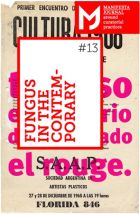 MANIFESTA JOURNAL LAUNCH ITS THIRD SERIES
MANIFESTA JOURNAL LAUNCH ITS THIRD SERIES Manifesta Journal is pleased to announce the launch of its third series. The format of Manifesta Journal (MJ), like the Manifesta biennial, is a changing model. It aims to facilitate a platform for a critical analyses into international curating and biennials in general. Every six editions, a new editorial team from diverse areas of Europe and beyond is invited to develop a different concept for the series, reflecting on contemporary Europe and the world.
For the first time in MJ‘s history, MJ #13–18 will be available for free online. Readers will also soon be able to order a print-on-demand issue.
After the manual for contemporary curatorship established in the first six issues of Manifesta Journal, MJ #1–6, by Viktor Misiano and Igor Zabel, and which continued in the series of six issues that were realized between 2009–2011 by Chief Editor Viktor Misiano, Senior Editor Nathalie Zonnenberg and Associate Editor Filipa Ramos, the editorial work of the Manifesta Journal for the upcoming six issues, MJ #13–18, has been handed over to Nataša Petrešin-Bachelez as Chief Editor and Virginie Bobin as Associate Editor.
Manifesta Journal can be regarded as a porous platform to reconsider the meanings and the effects of curatorial practices today, focusing on urgent (geo)political, humanistic, instigating and controversial potentialities. The new, encompassing subtitle, “Around Curatorial Practices” marks the trajectory from the previous subtitle, “Journal of Contemporary Curatorship”. The preposition “around” is devoted to what actually moves subjectivities when they adopt the notion of curating as responding to their practices, which are informed by drives, subversions, opacities, risks, desires, beliefs and solidarities.
The editorial team wishes to reflect upon current practices of reading, researching, publishing and curating that have been enabled by the internet and its social technologies, all the while exploring new formats and advocating the open circulation of knowledge through a free online and downloadable Manifesta Journal. The texts are now published under Creative Commons licence. Every two months, a blogger-in-residence is invited to share his/her research in progress: reflections on, assessments of, and reactions to a specific subject, starring Adnan Yildiz as our first resident.
Changing Guest Editors have been invited to collaborate on one or more issues of the series. MJ #13 is guest edited by the Manifesta 9 curatorial team, under the guidance of Cuauhtémoc Medina, in collaboration with the associate curators Katerina Gregos and Dawn Ades. MJ #14–16 will be realized with the collaboration of Rasha Salti.
MJ #13 “Fungus in the Contemporary”
The title for MJ #13 is a metaphor of the re-activation and re-contextualization of the 1960s in contemporary art practices in the form of artistic or historical notions that fictionalize, spy on, or cause delays in the contemporary condition. The “fungi” of neo-colonial structures that are at work in most postcolonial regions, keep on “staining” the way in which the present moment is perceived, analyzed and doubled. It includes contributions by Dawn Ades, Magali Arriola, Sven Augustijnen, Erick Beltrán and Victoria Noorthoorn, Bettina Knaup and Beatrice E. Stammer, Katerina Gregos, Miguel Lopez, Cuauhtémoc Medina, Mangelos, Tomáš Pospiszyl, Raqs Media Collective, Suely Rolnik and Narcisse Tordoir.
The editorial team of Manifesta Journal is composed of:
Chief Editor: Nataša Petrešin-Bachelez, Paris
Associate Editor: Virginie Bobin, Paris
Guest Editors:
MJ #13: Cuauhtémoc Medina, in collaboration with the associate curators Katerina Gregos and Dawn Ades
MJ #14–16: Rasha Salti, Beirut
Managing Editor: Lisa Mazza, London / Bolzano
Copy Editor: Shannon d’Avout, Paris
The design created by Paris based g.u.i. (Bachir Soussi-Chiadmi, Nicolas Couturier) has given the MJ a new and fresh look.
Manifesta Journal is an initiative of the Manifesta Foundation, Amsterdam, the Netherlands, and is generously supported by the European Commission and the Ministry of Education, Culture and Sciences of the Netherlands.